【2024春人教七下英语大单元教学高效课件】Unit 2 What time do you go to school? SectionA 1a~3c
文档属性
| 名称 | 【2024春人教七下英语大单元教学高效课件】Unit 2 What time do you go to school? SectionA 1a~3c |

|
|
| 格式 | pptx | ||
| 文件大小 | 34.6MB | ||
| 资源类型 | 试卷 | ||
| 版本资源 | 人教新目标(Go for it)版 | ||
| 科目 | 英语 | ||
| 更新时间 | 2024-02-21 00:00:00 | ||
图片预览


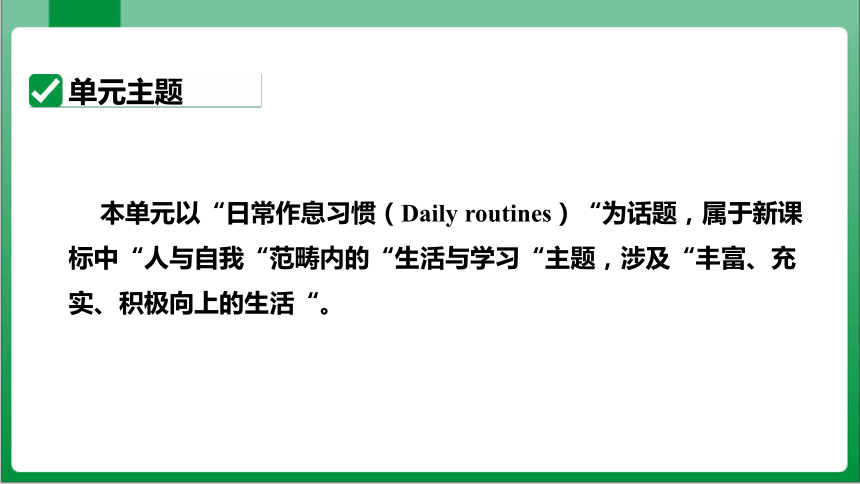
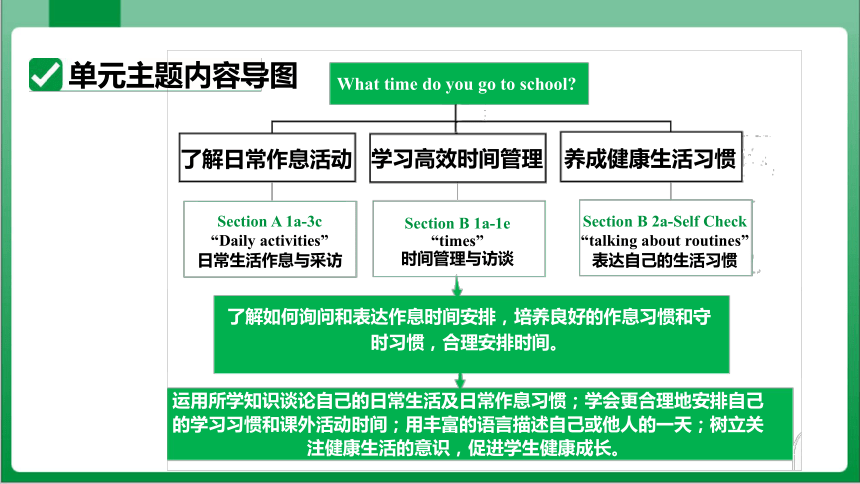
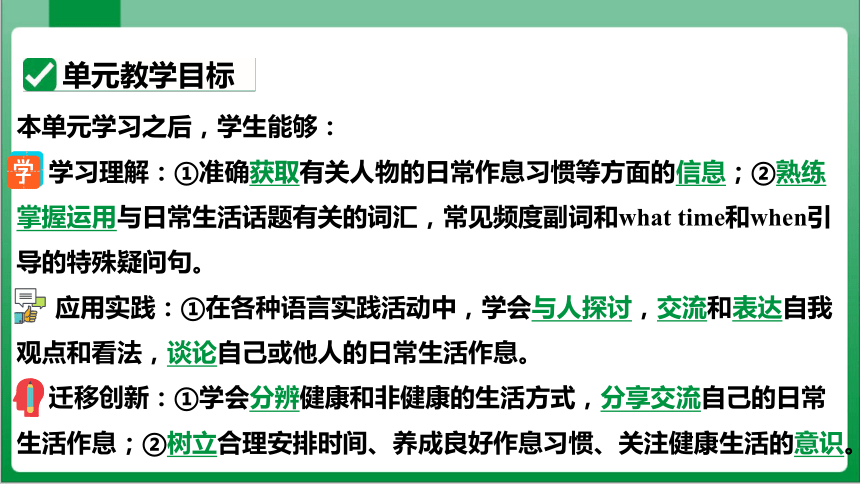


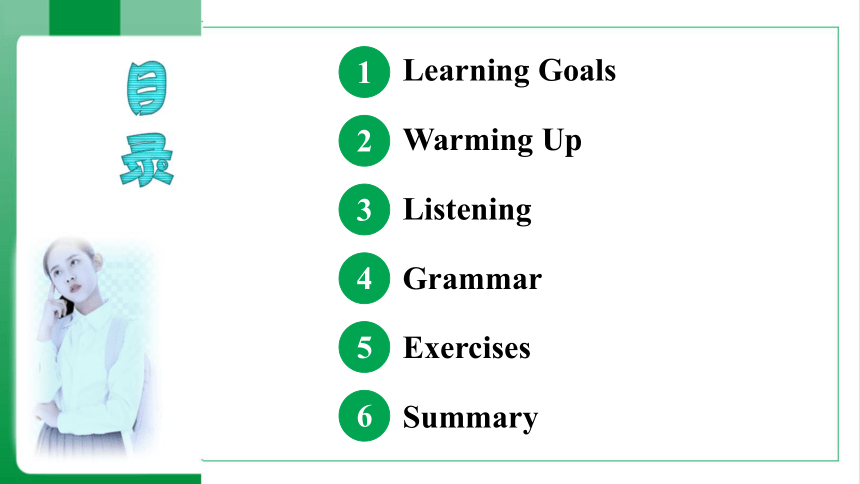


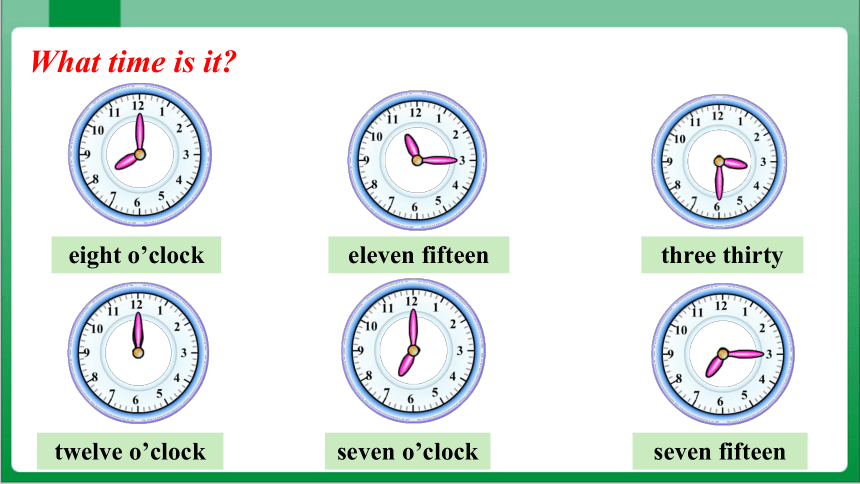

文档简介
(共56张PPT)
人教七下英语同步精品课件
人教版七年级下册
Unit 2 What time do you go to school
大 单 元 教 学
单元主题
本单元以“日常作息习惯(Daily routines)“为话题,属于新课标中“人与自我“范畴内的“生活与学习“主题,涉及“丰富、充实、积极向上的生活“。
单元主题内容导图
What time do you go to school
养成健康生活习惯
了解日常作息活动
学习高效时间管理
Section A 1a-3c
“Daily activities”
日常生活作息与采访
Section B 1a-1e
“times”
时间管理与访谈
Section B 2a-Self Check
“talking about routines”
表达自己的生活习惯
了解如何询问和表达作息时间安排,培养良好的作息习惯和守时习惯,合理安排时间。
运用所学知识谈论自己的日常生活及日常作息习惯;学会更合理地安排自己的学习习惯和课外活动时间;用丰富的语言描述自己或他人的一天;树立关注健康生活的意识,促进学生健康成长。
单元教学目标
本单元学习之后,学生能够:
学习理解:①准确获取有关人物的日常作息习惯等方面的信息;②熟练掌握运用与日常生活话题有关的词汇,常见频度副词和what time和when引导的特殊疑问句。
应用实践:①在各种语言实践活动中,学会与人探讨,交流和表达自我观点和看法,谈论自己或他人的日常生活作息。
迁移创新:①学会分辨健康和非健康的生活方式,分享交流自己的日常生活作息;②树立合理安排时间、养成良好作息习惯、关注健康生活的意识。
Unit 2 What time do you go to school
SectionA 1a~3c
中学生应该养成良好的生活习惯,合理地安排自己的学习和课外活动时间。为此,学校开启了关于日常生活作息的校园采访,旨在帮助同学们树立健康生活的意识,一起来看看吧!
核心任务
Learning Goals
1
1
Warming Up
2
Listening
3
Grammar
4
Summary
6
Exercises
5
Learning Goals
通过本课的学习,学生能够:
①听懂、会说并正确运用when和what time引导的特殊疑问句询问时间并会用数词表达不同的时间。
②用频度副词谈论自己的日常生活及日常作息习惯。
③学会更合理地安排自己的学习和课外活动时间,培养良好的作息和守时习惯。
Let’s first enjoy a video and then tell what it is about.
It is about an English teacher’s daily routine.(日常) Is it healthy
Warming Up
What time is it
eight o’clock
eleven fifteen
three thirty
twelve o’clock
seven o’clock
seven fifteen
Now, look at the picture and say the time.
seven fifteen
seven twenty
seven thirty
seven forty-five
six o’clock
six ten
six fifteen
six twenty
six thirty
six forty
six fifty
seven o’clock
Pre-listening
/ kl k /adv.
......点钟
1a Match the activities with the pictures.
1. get up __
2. go to school __
3. get dressed __
4. brush teeth __
5. eat breakfast __
6. take a shower __
c
d
b
f
e
a
起床
穿上衣服
刷牙
洗淋浴
你被选为了采访者,你邀请到的第一位同学是Rick,这是他的日常活动。
While-listening
Daily activities Time
get up (c)
brush teeth (f)
take a shower (a)
eat breakfast (e)
get dressed (b)
go to school (d)
6:30
6:40
6:40
7:00
7:20
7:30
Listen and write the times.
在采访的过程中,记录下他的日常活动时间。
1b Listen again and match the times with the actions. Draw lines from the clocks to the pictures.
采访结束后,不要忘记梳理好关于Rick的访谈资料。
Let’s listen again. You can read after the tape.
Interviewer: What time do you usually get up, Rick
Rick: Um, I usually get up at six thirty.①
Interviewer:And what time do you brush your teeth and take a shower
Rick: I brush my teeth and take a shower at six forty.
Interviewer: Hmm. What time do you eat breakfast
Rick: Seven o’clock.
Interviewer: And what time do you usually get dressed
Rick: I usually get dressed at seven twenty.
Interviewer: And my last question. What time do you go to school
Rick: I usually go to school at seven thirty.
Interviewer: Thank you.
/ ju u li /adv.通常地
/ f ti /num.四十
1c Student A is the interviewer. Student B is Rick. Ask and answer questions about Rick’s day.
A:What time do you usually take a shower, Rick
B:I usually take a shower at six forty.
Look at the picture and answer the questions.
How many people can you see
Are they happy Why
这是第二位受访者Jim,他向我们展示了一张有趣的照片。
2a Listen to the conversation and complete the sentences.
Jim has ________brothers and ________ sisters. Jim’s family has ______shower.
two
two
one
2. What does the word “schedule” mean
1. Does Jim have a big family Why do you think so
3. Is it difficult for Jim’s family to take showers Why or why not
听听他是怎样介绍自己的日常生活的。
2. What does the word “schedule” mean
1. Does Jim have a big family Why do you think so
3. Is it difficult for Jim’s family to take showers Why or why not
时刻表;工作计划,日程安排
Yes, he does. He has two brothers and two sisters.
No, it isn’t. Because they have a shower schedule.
2b Listen again. Complete the shower schedule for Jim’s family.
Name Bob Mary Jack Jim Anna
Time 5:30
5:50
6:15
6:30
6:45
在听听力时,听关键信息,做笔记写关键词。如本段听力中关键信息就是时间,写时间只需要写对数字。
Let’s listen again. You can read after the tape.
Interviewer: You have a big family, don’t you, Jim
Jim: Yes, I have two brothers and two sisters.
Interviewer: Wow! How many showers do you have
Jim:We only have one shower.
Interviewer: Is that difficult
Jim: No, because we have a shower schedule. My brother Bob takes a shower first at five thirty.
Interviewer: Wow! That’s early!
Jim:Yeah. Then my sister Mary takes a shower at five fifty. Next my brother Jack takes a shower at six fifteen. I take a shower at six thirty, my sister Anna at six forty-five…
/ li /adj.&adv.早
/ f fti /num.五十
2c Now talk about yourself.
What time do you usually get up
Do you get dressed quickly
Do you have breakfast at home or at school What time do you have breakfast
What time do you usually go to school
When do you do your homework
Look at the picture in 2d and guess.
What does the man do
He works at a radio station.
Maybe he is a radio host.
His job is playing music for people.
校园采访结束后,回到家在整理采访资料时,你发现里边意外混入了一张陌生人的照片。
Listen and answer the questions.
1. Does Scott have an interesting job Why do you think so
Yes, he does. Because his work time is different from the others’.
2. When does he get up and does he get up in the morning or at night
He gets up at eight thirty at night.
3. When does he eat breakfast Why does the interviewer say that it is a funny time to eat breakfast
He eats breakfast at nine at night. It is not in the morning and that is why it is a funny time.
Listen again and repeat after the tape.
Interviewer: Scott has an interesting job. He works at a radio station.②
Scott, what time is your radio show
Scott: From twelve o’clock at night to six o’clock in the morning.
Interviewer: What time do you usually get up
Scott: At eight thirty at night. Then I eat breakfast at nine.
from...to... 从……到
/ w k /n.&v.工作
广播电台
/ d b /n.工作
原来这是爸爸的朋友Scott,看着这张照片不禁对他的工作产生了兴趣,于是打电话给他。
Interviewer: That’s a funny time for breakfast!
Scott: Yeah. After that, I usually exercise at about ten twenty.
Interviewer: When do you go to work
Scott: At eleven o’clock, so I’m never late for work.
/ f ni /adj.奇怪的,滑稽好笑的
/ eks sa z /n.&v.锻炼;练习
/ nev (r) /adv.从不
be late for 迟到
Role play the converstion without looking at the textbook.
You can refer to the key words below.
has an interesting job work at a radio station(12 pm-6 am)
get up(8:30 pm) eat breakfast(9:00 pm) funny exercise(10:20 pm)
go to work(11:00 pm) be late for work
Post-listening
Grammar
Observe the chart on your textbook and then discuss the following questions.
①what time和when都可以提问时间,它们的回答有何异同?
②频度副词(usually,always,never)与动词的位置有何关系?
③在特殊疑问句中,单数第三人称(he, she)和其他人称在动词形式上有什么差异?
④在答语中,单数第三人称(he, she)和其他人称在动词形式上有什么差异?
What time do you usually get up I usually get up at six thirty.
What time do they get dressed They always get dressed at seven twenty.
What time does Rick eat breakfast He eats breakfast at seven o’clock.
When does Scott go to work He always goes to work at eleven o’clock. He’s never late.
When do your friends exercise They usually exercise on weekends.
①what time和when都可以提问时间,它们的回答有何异同?
在周末
what time与when都可以用来提问时间,表示“什么时候”;不同点为what time的回答仅仅为具体时刻;对于when的回答还可以更笼统的时间比如 on Sundays;in the morning.
— When is your birthday 教师节在什么时候?
— It’s on September 26th. 在9月26日。
What time do you usually get up I usually get up at six thirty.
What time do they get dressed They always get dressed at seven twenty.
What time does Rick eat breakfast He eats breakfast at seven o’clock.
When does Scott go to work He always goes to work at eleven o’clock. He’s never late.
When do your friends exercise They usually exercise on weekends.
②频度副词(usually,always,never)与动词的位置有何关系?
频度副词常位于实义动词之前,be动词之后。
(一)常见频度副词
always (100%)
总是
almost always
几乎总是
usually
通常
often
经常
sometimes
有时
hardly ever(seldom)
几乎从不(很少)
never(0%)
从不
>
>
>
>
>
>
频度副词的位置
I’m always happy to see her.
l shall always remember this.
I can never forget it.
实义动词之前
频度副词
be动词、助动词、情态动词之后
有时为了强调,频度副词也可位于句首。
She always goes to school by bus.
Sometimes he goes to work by bus.
What time do you usually get up I usually get up at six thirty.
What time do they get dressed They always get dressed at seven twenty.
What time does Rick eat breakfast He eats breakfast at seven o’clock.
When does Scott go to work He always goes to work at eleven o’clock. He’s never late.
When do your friends exercise They usually exercise on weekends.
③&④在特殊疑问句中&答语中,单数第三人称(he,she)和其他人称在动词形式上什么差异?
在问句中,单数第三人称前用助动词does,其他人称用do。
在陈述句或答语中,单数第三人称动词后会加词尾-s/-es,而其他人称则用动词原形。
what time和when引导的特殊疑问句的句式结构及回答
(1)句式结构:
What time/When + do/does +主语+动词原形+其他?
What time/When + be动词+主语+其他?
(2)回答what time或when引导的问句,可以用in,on或at等组成的表示时间的介词短语。
— When is your birthday party 他的生日在什么时候?
— In May. /On May 20th./At 7 p.m.
3a Write answers or questions. Use always, usually or never.
1. What time do you get up on school days
_______________________________________________________.
2. _______________________________________________________
Rick always gets up at 6:20.
3. What time do you have breakfast
________________________________________________________.
I usually get up at 6 o’clock on school days.
What time does Rick always get up
I usually have breakfast at 6:45.
4. __________________________________________________________
Anna never eats breakfast.
5. What time does your best friend go to school
___________________________________________________________.
What time/When does Anna eat breakfast
He/She goes to school at 7:15.
/ best /adj.最好的
3b Write about something you always do, something you usually do and something you never do.
e.g.
always:
I always go to school at seven o’clock in the morning.
usually:
I usually go to bed at 9:30 at night.
never:
I never exercise in the evenings.
Now, I’d like to know about you.
always:
______________________________________________________________
usually:
______________________________________________________________
never:
______________________________________________________________
3c Interview three of your classmates. Find out what time they do these activities. Then give a report to the class.
Student1 Name:____ Student2 Name:____ Student3
Name:____
get up on weekends
exercise
eat dinner
take a shower
go to school
In our group, Li Fei usually gets up late on weekends. She gets up at...
/ ɡru p /n.组;群
Post-learning
You can write your time schedule and talk with your friends about your daily routines.
Key Phrases
起床 ______________________
穿上衣服 ______________________
刷牙 ______________________
洗淋浴 ______________________
广播电台 ______________________
从……到…… ______________________
迟到 ______________________
在周末 ______________________
get up
get dressed
brush teeth
take a shower
radio station
from...to...
be late for
on weekends
What time 用于询问他人具体的时间,回答通常用具体的时刻。
1. —What time do you usually get up, Rick
—Um, I usually get up at six thirty.
Language Points
e.g. —What time do you usually go to bed
你通常几点睡觉
—I usually go to bed at ten thirty in the evening.
我通常晚上十点半上床睡觉。
返回
Instant Training
2. —What time do you usually take a shower
—I usually take a shower ___ _____ _____(9:00) in the evening.
1. —______ ______ do you usually brush teeth
—I usually brushed teeth at seven twenty.
What time
at nine o’clock
2. Scott has an interesting job. He works at a radio station.
work
① v. 工作 不及物动词,可单独使用,后不直接跟宾语。
There’s a time to work and a time to play.
工作、玩耍皆有时。
It is important to work but we must also have time to relax.
努力地工作是重要的,但我们也必须有时间放松。
② n. 工作(不可数);作品(可数)
Mia had been out of work for a year.
米娅已经失业一年了。
People came from all over the world to see her works.
观众从世界各地涌来观看她的作品。
job n. 工作(指具体的工作)可数名词
Hannah took a job as a teacher.
汉娜找了个当老师的工作。
返回
Instant Training
1. Mom was still at _______ when I got back.
2. When Jane was 25, she got a ______ as a teacher in a school.
work
job
work job
经历了本次的校园采访活动,你觉得非常有意义,值得记录下来,于是在今天的日记里写道:
Exercises
一、根据汉语意思填写单词。
Today, I get a ______ (工作) as a school interviewer. So I _______(起床) early. I _______________(刷牙) and ____________ (穿衣服) at 7 o’clock. Then I go to school at ____________(7:50). First I interview Rick about his daily activities.Then I interviewed Jim. There is also a
job
get up
brush my teeth
get dressed
seven fifty
_______(好笑的) thing in his big family that they have a ________(淋浴)
schedule. The last interviewee—— my father’s friend Scott _______(工作) at a ______________(广播电台), the time of his show is from twelve o’clock at _______(晚上) to six o’clock in the morning.
works
radio station
night
funny
shower
1. Listening and speaking: Talk about routines; Ask about and say times.
2. Words and Expressions:brush, tooth, usually, forty, wow, never, early, fifty, job, work, o’clock, night, funny, exercise, get up, get dressed, take a shower, radio station
3. Key sentences:
①—What time do you usually get up —I usually get up at six thirty.
②—When does Scott go to work
—He always goes to work at eleven o’clock.
Summary
Ask you parents what time they go to work/ have lunch/ go back home.
Take their answers down and share next class.
实践与拓展
谢谢
21世纪教育网(www.21cnjy.com)
中小学教育资源网站
兼职招聘:
https://www.21cnjy.com/recruitment/home/admin
人教七下英语同步精品课件
人教版七年级下册
Unit 2 What time do you go to school
大 单 元 教 学
单元主题
本单元以“日常作息习惯(Daily routines)“为话题,属于新课标中“人与自我“范畴内的“生活与学习“主题,涉及“丰富、充实、积极向上的生活“。
单元主题内容导图
What time do you go to school
养成健康生活习惯
了解日常作息活动
学习高效时间管理
Section A 1a-3c
“Daily activities”
日常生活作息与采访
Section B 1a-1e
“times”
时间管理与访谈
Section B 2a-Self Check
“talking about routines”
表达自己的生活习惯
了解如何询问和表达作息时间安排,培养良好的作息习惯和守时习惯,合理安排时间。
运用所学知识谈论自己的日常生活及日常作息习惯;学会更合理地安排自己的学习习惯和课外活动时间;用丰富的语言描述自己或他人的一天;树立关注健康生活的意识,促进学生健康成长。
单元教学目标
本单元学习之后,学生能够:
学习理解:①准确获取有关人物的日常作息习惯等方面的信息;②熟练掌握运用与日常生活话题有关的词汇,常见频度副词和what time和when引导的特殊疑问句。
应用实践:①在各种语言实践活动中,学会与人探讨,交流和表达自我观点和看法,谈论自己或他人的日常生活作息。
迁移创新:①学会分辨健康和非健康的生活方式,分享交流自己的日常生活作息;②树立合理安排时间、养成良好作息习惯、关注健康生活的意识。
Unit 2 What time do you go to school
SectionA 1a~3c
中学生应该养成良好的生活习惯,合理地安排自己的学习和课外活动时间。为此,学校开启了关于日常生活作息的校园采访,旨在帮助同学们树立健康生活的意识,一起来看看吧!
核心任务
Learning Goals
1
1
Warming Up
2
Listening
3
Grammar
4
Summary
6
Exercises
5
Learning Goals
通过本课的学习,学生能够:
①听懂、会说并正确运用when和what time引导的特殊疑问句询问时间并会用数词表达不同的时间。
②用频度副词谈论自己的日常生活及日常作息习惯。
③学会更合理地安排自己的学习和课外活动时间,培养良好的作息和守时习惯。
Let’s first enjoy a video and then tell what it is about.
It is about an English teacher’s daily routine.(日常) Is it healthy
Warming Up
What time is it
eight o’clock
eleven fifteen
three thirty
twelve o’clock
seven o’clock
seven fifteen
Now, look at the picture and say the time.
seven fifteen
seven twenty
seven thirty
seven forty-five
six o’clock
six ten
six fifteen
six twenty
six thirty
six forty
six fifty
seven o’clock
Pre-listening
/ kl k /adv.
......点钟
1a Match the activities with the pictures.
1. get up __
2. go to school __
3. get dressed __
4. brush teeth __
5. eat breakfast __
6. take a shower __
c
d
b
f
e
a
起床
穿上衣服
刷牙
洗淋浴
你被选为了采访者,你邀请到的第一位同学是Rick,这是他的日常活动。
While-listening
Daily activities Time
get up (c)
brush teeth (f)
take a shower (a)
eat breakfast (e)
get dressed (b)
go to school (d)
6:30
6:40
6:40
7:00
7:20
7:30
Listen and write the times.
在采访的过程中,记录下他的日常活动时间。
1b Listen again and match the times with the actions. Draw lines from the clocks to the pictures.
采访结束后,不要忘记梳理好关于Rick的访谈资料。
Let’s listen again. You can read after the tape.
Interviewer: What time do you usually get up, Rick
Rick: Um, I usually get up at six thirty.①
Interviewer:And what time do you brush your teeth and take a shower
Rick: I brush my teeth and take a shower at six forty.
Interviewer: Hmm. What time do you eat breakfast
Rick: Seven o’clock.
Interviewer: And what time do you usually get dressed
Rick: I usually get dressed at seven twenty.
Interviewer: And my last question. What time do you go to school
Rick: I usually go to school at seven thirty.
Interviewer: Thank you.
/ ju u li /adv.通常地
/ f ti /num.四十
1c Student A is the interviewer. Student B is Rick. Ask and answer questions about Rick’s day.
A:What time do you usually take a shower, Rick
B:I usually take a shower at six forty.
Look at the picture and answer the questions.
How many people can you see
Are they happy Why
这是第二位受访者Jim,他向我们展示了一张有趣的照片。
2a Listen to the conversation and complete the sentences.
Jim has ________brothers and ________ sisters. Jim’s family has ______shower.
two
two
one
2. What does the word “schedule” mean
1. Does Jim have a big family Why do you think so
3. Is it difficult for Jim’s family to take showers Why or why not
听听他是怎样介绍自己的日常生活的。
2. What does the word “schedule” mean
1. Does Jim have a big family Why do you think so
3. Is it difficult for Jim’s family to take showers Why or why not
时刻表;工作计划,日程安排
Yes, he does. He has two brothers and two sisters.
No, it isn’t. Because they have a shower schedule.
2b Listen again. Complete the shower schedule for Jim’s family.
Name Bob Mary Jack Jim Anna
Time 5:30
5:50
6:15
6:30
6:45
在听听力时,听关键信息,做笔记写关键词。如本段听力中关键信息就是时间,写时间只需要写对数字。
Let’s listen again. You can read after the tape.
Interviewer: You have a big family, don’t you, Jim
Jim: Yes, I have two brothers and two sisters.
Interviewer: Wow! How many showers do you have
Jim:We only have one shower.
Interviewer: Is that difficult
Jim: No, because we have a shower schedule. My brother Bob takes a shower first at five thirty.
Interviewer: Wow! That’s early!
Jim:Yeah. Then my sister Mary takes a shower at five fifty. Next my brother Jack takes a shower at six fifteen. I take a shower at six thirty, my sister Anna at six forty-five…
/ li /adj.&adv.早
/ f fti /num.五十
2c Now talk about yourself.
What time do you usually get up
Do you get dressed quickly
Do you have breakfast at home or at school What time do you have breakfast
What time do you usually go to school
When do you do your homework
Look at the picture in 2d and guess.
What does the man do
He works at a radio station.
Maybe he is a radio host.
His job is playing music for people.
校园采访结束后,回到家在整理采访资料时,你发现里边意外混入了一张陌生人的照片。
Listen and answer the questions.
1. Does Scott have an interesting job Why do you think so
Yes, he does. Because his work time is different from the others’.
2. When does he get up and does he get up in the morning or at night
He gets up at eight thirty at night.
3. When does he eat breakfast Why does the interviewer say that it is a funny time to eat breakfast
He eats breakfast at nine at night. It is not in the morning and that is why it is a funny time.
Listen again and repeat after the tape.
Interviewer: Scott has an interesting job. He works at a radio station.②
Scott, what time is your radio show
Scott: From twelve o’clock at night to six o’clock in the morning.
Interviewer: What time do you usually get up
Scott: At eight thirty at night. Then I eat breakfast at nine.
from...to... 从……到
/ w k /n.&v.工作
广播电台
/ d b /n.工作
原来这是爸爸的朋友Scott,看着这张照片不禁对他的工作产生了兴趣,于是打电话给他。
Interviewer: That’s a funny time for breakfast!
Scott: Yeah. After that, I usually exercise at about ten twenty.
Interviewer: When do you go to work
Scott: At eleven o’clock, so I’m never late for work.
/ f ni /adj.奇怪的,滑稽好笑的
/ eks sa z /n.&v.锻炼;练习
/ nev (r) /adv.从不
be late for 迟到
Role play the converstion without looking at the textbook.
You can refer to the key words below.
has an interesting job work at a radio station(12 pm-6 am)
get up(8:30 pm) eat breakfast(9:00 pm) funny exercise(10:20 pm)
go to work(11:00 pm) be late for work
Post-listening
Grammar
Observe the chart on your textbook and then discuss the following questions.
①what time和when都可以提问时间,它们的回答有何异同?
②频度副词(usually,always,never)与动词的位置有何关系?
③在特殊疑问句中,单数第三人称(he, she)和其他人称在动词形式上有什么差异?
④在答语中,单数第三人称(he, she)和其他人称在动词形式上有什么差异?
What time do you usually get up I usually get up at six thirty.
What time do they get dressed They always get dressed at seven twenty.
What time does Rick eat breakfast He eats breakfast at seven o’clock.
When does Scott go to work He always goes to work at eleven o’clock. He’s never late.
When do your friends exercise They usually exercise on weekends.
①what time和when都可以提问时间,它们的回答有何异同?
在周末
what time与when都可以用来提问时间,表示“什么时候”;不同点为what time的回答仅仅为具体时刻;对于when的回答还可以更笼统的时间比如 on Sundays;in the morning.
— When is your birthday 教师节在什么时候?
— It’s on September 26th. 在9月26日。
What time do you usually get up I usually get up at six thirty.
What time do they get dressed They always get dressed at seven twenty.
What time does Rick eat breakfast He eats breakfast at seven o’clock.
When does Scott go to work He always goes to work at eleven o’clock. He’s never late.
When do your friends exercise They usually exercise on weekends.
②频度副词(usually,always,never)与动词的位置有何关系?
频度副词常位于实义动词之前,be动词之后。
(一)常见频度副词
always (100%)
总是
almost always
几乎总是
usually
通常
often
经常
sometimes
有时
hardly ever(seldom)
几乎从不(很少)
never(0%)
从不
>
>
>
>
>
>
频度副词的位置
I’m always happy to see her.
l shall always remember this.
I can never forget it.
实义动词之前
频度副词
be动词、助动词、情态动词之后
有时为了强调,频度副词也可位于句首。
She always goes to school by bus.
Sometimes he goes to work by bus.
What time do you usually get up I usually get up at six thirty.
What time do they get dressed They always get dressed at seven twenty.
What time does Rick eat breakfast He eats breakfast at seven o’clock.
When does Scott go to work He always goes to work at eleven o’clock. He’s never late.
When do your friends exercise They usually exercise on weekends.
③&④在特殊疑问句中&答语中,单数第三人称(he,she)和其他人称在动词形式上什么差异?
在问句中,单数第三人称前用助动词does,其他人称用do。
在陈述句或答语中,单数第三人称动词后会加词尾-s/-es,而其他人称则用动词原形。
what time和when引导的特殊疑问句的句式结构及回答
(1)句式结构:
What time/When + do/does +主语+动词原形+其他?
What time/When + be动词+主语+其他?
(2)回答what time或when引导的问句,可以用in,on或at等组成的表示时间的介词短语。
— When is your birthday party 他的生日在什么时候?
— In May. /On May 20th./At 7 p.m.
3a Write answers or questions. Use always, usually or never.
1. What time do you get up on school days
_______________________________________________________.
2. _______________________________________________________
Rick always gets up at 6:20.
3. What time do you have breakfast
________________________________________________________.
I usually get up at 6 o’clock on school days.
What time does Rick always get up
I usually have breakfast at 6:45.
4. __________________________________________________________
Anna never eats breakfast.
5. What time does your best friend go to school
___________________________________________________________.
What time/When does Anna eat breakfast
He/She goes to school at 7:15.
/ best /adj.最好的
3b Write about something you always do, something you usually do and something you never do.
e.g.
always:
I always go to school at seven o’clock in the morning.
usually:
I usually go to bed at 9:30 at night.
never:
I never exercise in the evenings.
Now, I’d like to know about you.
always:
______________________________________________________________
usually:
______________________________________________________________
never:
______________________________________________________________
3c Interview three of your classmates. Find out what time they do these activities. Then give a report to the class.
Student1 Name:____ Student2 Name:____ Student3
Name:____
get up on weekends
exercise
eat dinner
take a shower
go to school
In our group, Li Fei usually gets up late on weekends. She gets up at...
/ ɡru p /n.组;群
Post-learning
You can write your time schedule and talk with your friends about your daily routines.
Key Phrases
起床 ______________________
穿上衣服 ______________________
刷牙 ______________________
洗淋浴 ______________________
广播电台 ______________________
从……到…… ______________________
迟到 ______________________
在周末 ______________________
get up
get dressed
brush teeth
take a shower
radio station
from...to...
be late for
on weekends
What time 用于询问他人具体的时间,回答通常用具体的时刻。
1. —What time do you usually get up, Rick
—Um, I usually get up at six thirty.
Language Points
e.g. —What time do you usually go to bed
你通常几点睡觉
—I usually go to bed at ten thirty in the evening.
我通常晚上十点半上床睡觉。
返回
Instant Training
2. —What time do you usually take a shower
—I usually take a shower ___ _____ _____(9:00) in the evening.
1. —______ ______ do you usually brush teeth
—I usually brushed teeth at seven twenty.
What time
at nine o’clock
2. Scott has an interesting job. He works at a radio station.
work
① v. 工作 不及物动词,可单独使用,后不直接跟宾语。
There’s a time to work and a time to play.
工作、玩耍皆有时。
It is important to work but we must also have time to relax.
努力地工作是重要的,但我们也必须有时间放松。
② n. 工作(不可数);作品(可数)
Mia had been out of work for a year.
米娅已经失业一年了。
People came from all over the world to see her works.
观众从世界各地涌来观看她的作品。
job n. 工作(指具体的工作)可数名词
Hannah took a job as a teacher.
汉娜找了个当老师的工作。
返回
Instant Training
1. Mom was still at _______ when I got back.
2. When Jane was 25, she got a ______ as a teacher in a school.
work
job
work job
经历了本次的校园采访活动,你觉得非常有意义,值得记录下来,于是在今天的日记里写道:
Exercises
一、根据汉语意思填写单词。
Today, I get a ______ (工作) as a school interviewer. So I _______(起床) early. I _______________(刷牙) and ____________ (穿衣服) at 7 o’clock. Then I go to school at ____________(7:50). First I interview Rick about his daily activities.Then I interviewed Jim. There is also a
job
get up
brush my teeth
get dressed
seven fifty
_______(好笑的) thing in his big family that they have a ________(淋浴)
schedule. The last interviewee—— my father’s friend Scott _______(工作) at a ______________(广播电台), the time of his show is from twelve o’clock at _______(晚上) to six o’clock in the morning.
works
radio station
night
funny
shower
1. Listening and speaking: Talk about routines; Ask about and say times.
2. Words and Expressions:brush, tooth, usually, forty, wow, never, early, fifty, job, work, o’clock, night, funny, exercise, get up, get dressed, take a shower, radio station
3. Key sentences:
①—What time do you usually get up —I usually get up at six thirty.
②—When does Scott go to work
—He always goes to work at eleven o’clock.
Summary
Ask you parents what time they go to work/ have lunch/ go back home.
Take their answers down and share next class.
实践与拓展
谢谢
21世纪教育网(www.21cnjy.com)
中小学教育资源网站
兼职招聘:
https://www.21cnjy.com/recruitment/home/admin
同课章节目录
- Unit 1 Can you play the guitar?
- Section A
- Section B
- Unit 2 What time do you go to school?
- Section A
- Section B
- Unit 3 How do you get to school?
- Section A
- Section B
- Unit 4 Don't eat in class.
- Section A
- Section B
- Unit 5 Why do you like pandas?
- Section A
- Section B
- Unit 6 I'm watching TV.
- Section A
- Section B
- Review of Units 1-6
- Unit 7 It's raining!
- Section A
- Section B
- Unit 8 Is there a post office near here?
- Section A
- Section B
- Unit 9 What does he look like?
- Section A
- Section B
- Unit 10 I'd like some noodles.
- Section A
- Section B
- Unit 11 How was your school trip?
- Section A
- Section B
- Unit 12 What did you do last weekend?
- Section A
- Section B
